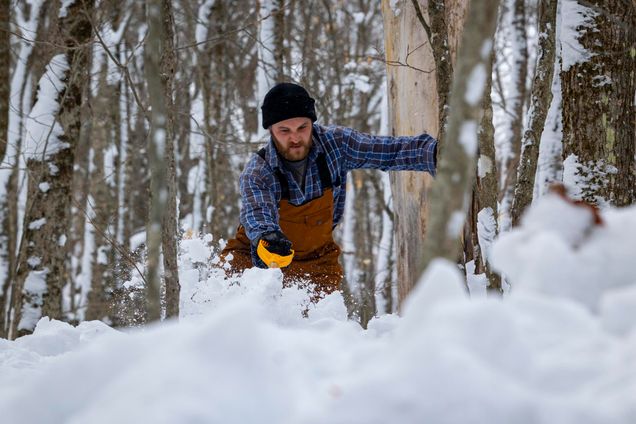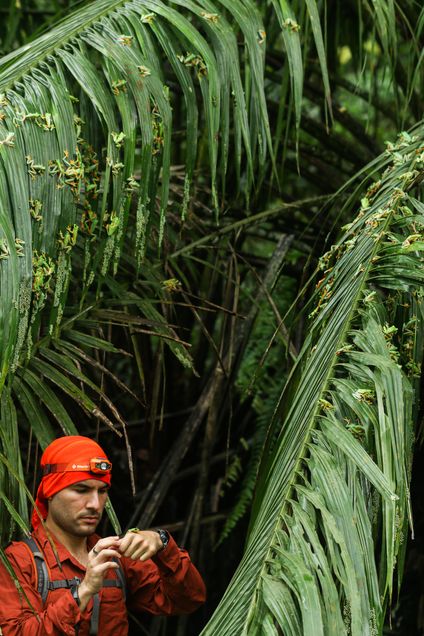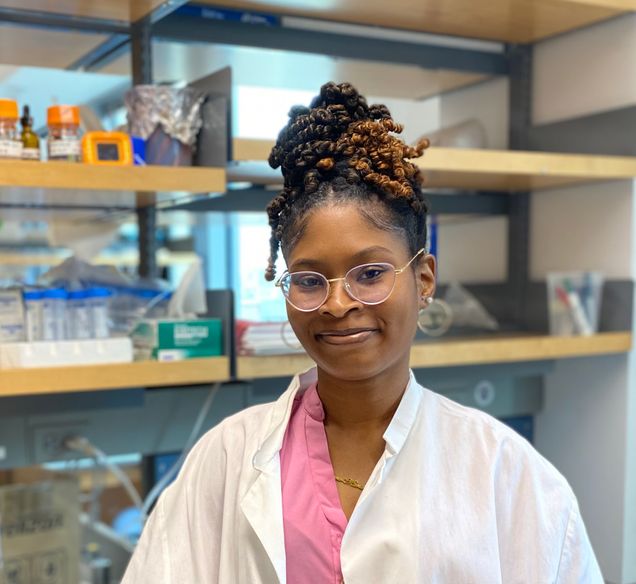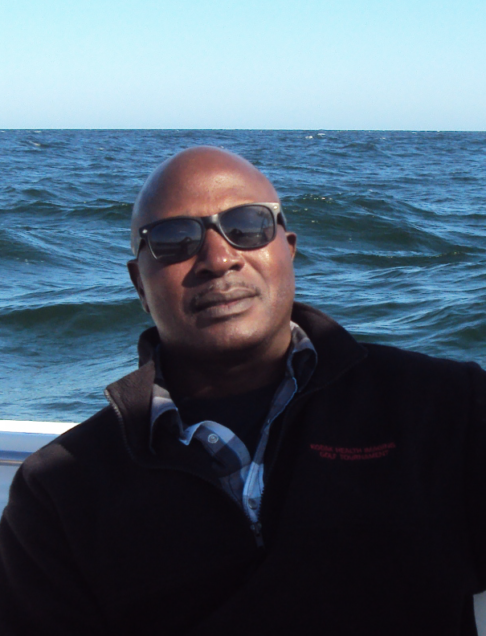Stephen Caron Receives 2023 Thomas H. Kunz Award
Congratulations to Stephen Caron for receiving the Thomas H. Kunz Award! This award is given to EBE Ph.D. candidates who have completed the qualifying exam conducting research.
Stephen studies the impacts of urbanization and climate change on crucial nutrient cycles in mixed temperate and northern hardwood forests. In particular, he is interested in exploring the effects of changing seasonality, including reduced winter snowpack, earlier spring snowmelt, and longer growing seasons, on nitrogen cycling in forests. His work aims to better understand how multiple global change drivers impact a forest's ability to cycle nutrients and sequester carbon.
Stephen's advice for student interested in ecology is:
"Utilize the incredible ecology community here at BU and New England in general! My time in the Templer Lab has included collaborations across departments at BU and with researchers around the region, which has enriched my experience and allowed me to explore larger scientific questions."

Congratulations, Stephen!
Brandon Guell Receives 2023 Belamarich Dissertation Writing Award
Congratulations to Ph.D. candidate Brandon Guell for receiving the Belamarich Dissertation Writing Award. This award supports outstanding Ph.D. students through their dissertation writing stage.
Brandon is a Costa Rican-American NSF Pre-doctoral Research Fellow and Ph.D. candidate at Boston University studying the reproductiv
e and behavioral ecology of gliding tree frogs, Agalychnis spurrelli, for his Ph.D. dissertation research. His research focuses on explosive breeding and its consequences for critical adult and embryo behaviors in gliding treefrogs. He received his B.S. from UC San Diego. He collaborated with NOAA’s National Marine Mammal Lab to study northern fur seal pups’ foraging ecology and behavior on the Pribilof Islands in Alaska.
His passion for wildlife, conservation, and animal behavior began very young, primarily due to traveling throughout Costa Rica with his family as a child. His interest in wildlife photography developed at the start of his Ph.D., initially from using it as a tool to study animal behavior in the field. Now, he aims to use photography not only to communicate science but also to help inspire a passion for wildlife and create advocacy for conservation.

“I consider myself a field biologist and a behavioral ecologist. That means I’m interesting in understanding how organisms interact with each other and their environment from a behavioral perspective.”
Brandon’s Ph.D. research focuses on understanding explosive breeding and its consequences for critical adult and embryo behaviors in gliding treefrogs (Agalychnis spurrelli). Gliding treefrogs reproduce during significant explosive-breeding events where hundreds to thousands of adults aggregate on vegetation overhanging forest ponds in Central and South America. However, natural history information on A. spurrelli reproduction is limited; much of it is anecdotal or based on untested hypotheses. The first part of his dissertation addresses the gap in knowledge by examining the reproductive ecology of explosive breeding and its consequences for adult behavior in A. spurrelli. The second part of his dissertation assesses the effects of A. spurrelli’s reproductive phenology on embryo behavior. It tests two hypotheses about why their embryos show lower escape-hatching success to snakes than their close relative, A. callidryas.
Brandon hopes to improve the understanding of the reproductive ecology of gliding treefrogs and the factors contributing to their low rates of escape-hatching success in snake attacks. His work also has broader implications for understanding how breeding patterns and mating strategies affect behavior at multiple life stages.
Congratulations Brandon!
Chip Celenza Receives 2023 Susan K. Jackson Award
Congratulations to Prof. Chip Celenza for receiving the 2023 Susan K. Jackson faculty award! This award recognizes students, faculty, and staff who help to foster the unique and vibrant intellectual community in the College of Arts & Sciences. Susan K. Jackson was an outstanding long-time staff member in CAS who passed away in 2017.
Dr. Celenza is selected for his efforts to build community in the Department of Biology and across the College of Arts and Sciences. He is a longtime BU faculty member who has dedicated 28 years to the Department of Biology. Dr. Celenza is described by his colleagues as a caring and patient mentor and advisor, whose willingness to help his students is unparalleled. He has also contributed in significantly to the development of various academic programs and fostering a supportive environment at BU. His ongoing involvement the Biology Antiracism Committee and Biochemistry and Molecular Biology program has helped the Biology Department and the many students he has taught and advised flourish. His dedication to mentorship, academic program development, and community building has had a profound impact on the Department of Biology and CAS as a whole.

Congratulations, Dr. Celenza!
Dr. Tuan Leng Tay Receives 2023 Spivack Neuroscience Pilot Award
Congratulations to Dr. Tuan Leng Tay for receiving the 2023 Spivack Neuroscience Pilot Award.
Jack Spivack, a founding member of the MED Dean’s Advisory Board, established these awards in 2013 to recognize and support the research of outstanding faculty conducting either clinical or basic research in Parkinson’s, Alzheimer’s, Chronic Traumatic Encephalopathy, and other neurological disorders.
Dr. Tay seeks to understand the processes and mechanisms underlying these changes across the lifespan by studying microglia, which are implicated in all brain pathologies. The Tay lab applies various approaches, including using different biological models, high-resolution microscopy, next-generation sequencing, multi-omic technologies, and machine learning-based analyses. Dr. Tay wants to investigate how microglia function and why they fail to function in chronic neurodegeneration.

Congratulations, Dr. Tay!
Anne-Marie Abban-Demitrus Receives AAUW Fellowship

Biology PhD student, Anne-Marie Abban-Demitrus, recently received a $25,000 International Fellowship from the American Association of University Women (AAUW). This fellowship provides support for women pursuing full-time graduate or postdoctoral study in the United States to women who are not U.S. citizens or permanent residents, and who intend to return to their home country to pursue a professional career.
Anne-Marie is a second-year, Ghanaian PhD student. Her research interests currently center the study of the Gut-Brain-Microbiota axis (GBMAx) and the effect of Traumatic Brain Injury on these axial relations. She is dedicated to the study of the GBMAx as it implicated in a prodigious number of neurological maladies that disproportionately affect women. Her ultimate feminist ambition is to contribute influential research that improves the quality of life and educational equity for Ghanaian women. Anne-Marie hopes to use the AAUW fellowship to pursue her research goals. In her spare time, Anne-Marie enjoys sketching, dancing, reading, and personal fitness.
Congratulations, Anne-Marie!
Joanna Lee Receives 2023 Economakis Award

Joanna Lee of the Finnerty Lab received the 2023 Alistair Economakis Award in Marine Science. This award provides support for graduate students conducting research in marine science with a focus on research related to ecology, evolution, or behavior.
Joanna Lee is performing research on the Mnemiopsis leidyi-Edwardsiella lineata host-parasite system. M. leidyi is a zooplankton predator of interest in its native range alongside the US East Coast and in its invasive range in Eurasian waters; previous research has shown that in the ctenophore’s native range, infestation by E. lineata is a potentially powerful control on the ctenophore’s population. Joanna has conducted foundational ecological studies on the M. leidyi-E. lineata system including surveying the infection frequency and intensity around Massachusetts and Rhode Island, testing the effect of temperature and salinity on E. lineat survival and development, and performing population genomic analyses on juvenile parasite and adult E. lineatapopulations. Using these data, Joanna aims to build the first jellyfish-symbiont population dynamics model.
Congratulations, Joanna!
Meg A. Younger, PhD was selected as a 2023 recipient for the Smith Family Foundation Excellence in Biomedical Research Award!
Meg Younger has been awarded the Smith Family Award for Excellence in Biomedical Research. The Richard and Susan Smith Family Awards Program for Excellence in Biomedical Research supports promising pre-tenure researchers as they establish their first independent lab. Its mission is to launch the careers of newly independent biomedical researchers with the ultimate goal of achieving medical breakthroughs. Congratulations Meg!
Chip Celenza Becomes DIAT Member
Dr. Chip Celenza is one of the newest members of DIAT, a representative group across CAS and GRS that facilitates and implements diversity, equity, and inclusion at BU. The team consists of 12-15 members of faculty, staff, and students who are committed to addressing: (1)Assessing Accessibility in CAS (2) First Year Success, and (3) Engaging undergraduate student DEI needs.
Dr. Celenza describes himself as growing up in a homogeneous “majority” town without economic hardship. However, he has found common ground with those from different socioeconomic backgrounds and recognizes his own pre-conceived judgments about people from diverse backgrounds. He states,
“Advising and teaching students at BU has played an important role in making me aware of my biases and helping me change them.”
BU students come from diverse socioeconomic backgrounds where school systems and communities may have not provided adequate support or opportunities. This results in some students being at a disadvantage academically and socially. Moreover, students may experience economic hardship, resulting in them working long hours during the semester. As a faculty member, Dr. Celenza has taken responsibility for becoming more aware that some students may require remedial help to get caught up with more advantaged classmates. He also recognizes that students have limited time when completing assignments outside of class. Dr. Celenza remarks that BU faculty members should consider the grading policies that allow grade remediation and flexibility in assignment deadlines.
“My commitment to diversity means suppressing pre-conceived judgments based on stereotypes and be sure to listen (and ask) for student concerns. I try to demonstrate my commitment to diversity by involving myself in department and college level groups aimed at recognizing and supporting diversity across BU. I would say that I am a novice and I participate to learn.”
Congratulations, Dr. Celenza!

Fall 2022 Outstanding Biology Learning Assistant Awards
The Biology Department recognized the hard work and innovation of all of our Learning Assistants (LAs) by presenting “The Outstanding Learning Assistant Award” to two groups of Biology LAs for the fall 2022 semester. These students presented posters that were judged by the Biology Honors Committee to best outline procedures that will improve teaching in our undergraduate courses. Financial support for this award is made possible by Professor Emerita Elizabeth Godrick.
John Okechi Published in Conservation Science and Practice

Dr. John Okechi's paper, The ecological health of Lake Victoria (Kenya) in the face of growing cage aquaculture, was recently published in Conservation Science and Practice. The paper was based on his dissertation work completed while obtaining his PhD in Biology in the Kaufman Lab.
Okechi is an experienced and enthusiastic marine biologist; highly passionate about the study of marine environmental issues, aquaculture and biodiversity conservation. He is committed to excellence in research, and is a skilled leader in the field and at the bench, working with people from diverse backgrounds. For the last five years, he has been a significant member of the Kaufman Lab at BU. He is currently a visiting researcher in the Kaufman Lab. A synopsis of the paper is below.
The rapid growth of cage aquaculture in Lake Victoria has raised concerns regarding its contribution to eutrophication and implications for biodiversity conservation. The results show no difference in environmental conditions between cage and control stations, and a significantly higher total fish biomass at cages stations. If practiced properly and kept within environmental limits, cage aquaculture in Lake Victoria holds the promise of enhancing food security, helping to safeguard freshwater biodiversity, and empowering women in the workforce.
Read the paper here: http://doi.org/10.1111/csp2.12826.
Congratulations, Okechi!